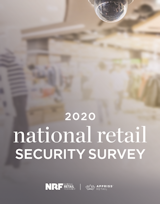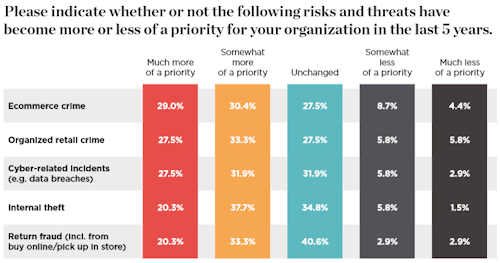
Retail Shrink Totaled $61.7 Billion in 2019
Amid Rising Employee Theft and Shoplifting/ORC
2020 National Retail Security
Survey finds shrink at an all-time high

WASHINGTON, July 14, 2020 - Theft, fraud and losses from other retail
"shrink" totaled $61.7 billion in 2019, up from $50.6 billion the year before
as industry security executives reported increases in the number of shoplifting,
organized retail crime and employee theft incidents, according to the annual
National Retail Security Survey released today by the National Retail
Federation.
 "Between
an increase in incidents and new ways to steal, shrink is at an all-time high," NRF Vice President for Research Development and Industry Analysis Mark Mathews
said. "Loss prevention experts are facing unprecedented challenges from
individual shoplifters to organized gangs to highly skilled cybercriminals.
Retailers are responding with both traditional methods and the latest
technology, but this is an ongoing challenge that can only be won with the
support of lawmakers and law enforcement." "Between
an increase in incidents and new ways to steal, shrink is at an all-time high," NRF Vice President for Research Development and Industry Analysis Mark Mathews
said. "Loss prevention experts are facing unprecedented challenges from
individual shoplifters to organized gangs to highly skilled cybercriminals.
Retailers are responding with both traditional methods and the latest
technology, but this is an ongoing challenge that can only be won with the
support of lawmakers and law enforcement."
According to the report, shrink averaged 1.62 percent of sales during 2019,
up from 1.38 percent in 2018 after hovering around 1.4 percent over the past few
years. The number of cases was up, with an average 560 employee theft
apprehensions per retailer surveyed (up from 323 last year) and 689 shoplifting/ORC
apprehensions (up from 509).
Rising incidents of theft have coincided with a period when states have amended
laws to increase the dollar threshold that constitutes a felony, which is more
likely to be prosecuted than a misdemeanor. Members of ORC gangs often make
multiple small thefts, staying below the felony threshold to avoid prosecution,
so NRF has called for repeat offenses to be aggregated and counted toward felony
thresholds to reflect the serious nature of organized theft.
Shoplifting/organized theft and employee theft together typically account for
about two-thirds of shrink each year.
While 49 percent of those surveyed said the largest increase in fraud occurred
in stores, 26 percent said it happened online and 19 percent cited multichannel
sales, including those where the purchase is made online but the merchandise is
picked up in-store. Typical fraud incidents range from the use of stolen credit
cards or card numbers and gift card scams to the return of stolen merchandise
for refunds.
Of challenges that have grown in priority for LP teams over the past five years,
61 percent cited ORC, 59 percent ecommerce and cybercrimes, 58 percent
internal theft and 54 percent return fraud. To fight losses, retailers
reported increased use of technology such as point-of-sale analytics, security
cameras, wired alarms on high-value merchandise and online training for
employees among other steps. Additional technology resources were being
allocated, according to 52 percent of those surveyed, while 36 percent said loss
prevention budgets were increasing and 30 percent were adding LP staff.

The survey of 69 LP and asset protection executives from a variety of retail
sectors was conducted February 24 through April 21. The study is sponsored by
Appriss Retail.
About NRF
The
National Retail Federation, the world's largest retail trade association,
passionately advocates for the people, brands, policies and ideas that help
retail thrive. From its headquarters in Washington, D.C., NRF empowers the
industry that powers the economy. Retail is the nation's largest private-sector
employer, contributing $3.9 trillion to annual GDP and supporting one in four
U.S. jobs - 52 million working Americans. For over a century, NRF has been a
voice for every retailer and every retail job, educating, inspiring and
communicating the powerful impact retail has on local communities and global
economies.
Click here to download the survey
|




